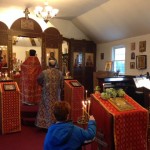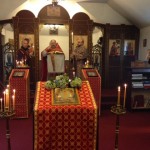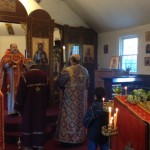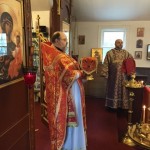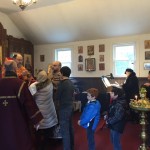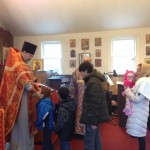On December 14, on the 27th Sunday after Pentecost we had a beautiful liturgical celebration at St. George Church. The Divine Liturgy was served by our Rector, Archpriest Igor Tarasov. Following the reading from the Gospel he preached a homily in Russian language. The English translation of that homily is as follows:
“Today’s reading from the Gospel of Luke repeats for us a story of a young ruler who had a conversation with our Lord Jesus Christ. They spoke about a way of inheriting eternal life. A couple of months ago we heard and discussed the same story written in the Gospel of Matthew. Therefore, today we should speak about some other aspects of the same conversation.”
“The young ruler started his questioning of Jesus by referring to Him as to the “Good Teacher”. The Lord corrected him right away and said: “Why do you call Me good? No one is good, but One, that is God.” (Lk. 18, 19). By these words Jesus wished to stress His humanity and to teach the young ruler that no man can be really called good. Only God is really good. God is the source of all goodness, He is the only perfect being. Thus, no one else can be considered truly good. St. Dionysius Areopagite wrote that the primary name of God is “the Good one” because it is impossible to say about God what is primary or secondary in Him – essence or goodness.”
“The truly and perfectly good God gives His goodness to the creation. When He created the world He said that the world is good (Gen. 2, 31). God is not a cause of evil. Evil came to existence as a result of the free will of the creatures – some angels and man. Interestingly, the Muslims believe that God is a source of both good and evil; as such, God is not just the good one, but the evil one too. Our Christian faith differs from the Islam and confirms that God is infinitely good and cannot be the source of evil or misfortune. All evil phenomena in the world originate not from God, but from the evil will of the people, as well as from the activity of the evil spirits.”
“When man broke the only commandment given by God, the whole earthly creation became cursed and open to the attacks of the evil forces. Evil became part of our nature. Evil began to permeate the whole creation. But God’s goodness is still accessible to us. A desire to do good is implanted in our hearts, as well as the evil inclinations. This is why it is a Christian understanding, a teaching of the Gospel and of the Holy Fathers, that the way of salvation is a hard work to make our sinful nature similar to divine nature. It is a constant fight between good and evil inside of our heart. This is why it does not sound very Christian when we hear the people saying something like “I am a good person”. No, we are not. God is the only good. We may only strive to be like Him. We are sinful, therefore not totally good. And we are to be even worse without God’s help.”
“The young ruler in today’s Gospel had a great difficulty to follow Jesus because he was too much attached to his wealth. This is why Jesus said that it is very hard for a rich man to enter the Kingdom of God. But any person, not just a rich one, has something he would not give up easily. And such a thing, to which we are attached to here on earth, keeps us away from heaven. It makes us attain less of the goodness. In such a helpless state of attachment to the earthly things we need a special, supernatural assistance to be saved. And God is giving us such assistance which we call the divine grace. This is why Jesus says that things impossible with men are possible with God.”
“Therefore, dear brothers and sisters, let us live obtaining the divine grace, the only help we can receive for our salvation. Let us grow in goodness to become closer to God, the source of all good. Let us remember our weakness and unworthiness in order to obtain the power of divine grace and then become worthy of the good and loving Lord Jesus Christ and inherit His eternal Kingdom.”
After the Liturgy dismissal the Rector congratulated our altar server Andrew Malyshew on the occasion of his past name day. The traditional Polychronion (“Mnogaia leta”) was proclaimed.
Following the service the Rector and parishioners enjoyed delicious food and a nice company at the coffee hour.

